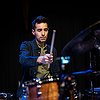Part 3
How do you make use of technology? In terms of the feedback mechanism between technology and creativity, what do humans excel at, what do machines excel at?
I am quite deeply engaged with technology now.
My other artist output is Seasonal Affected Beats which is improvised electronic music and is heavily reliant on a technology which is both hardware and software and this is sensory percussion. My relationship with technology has definitely changed because of this piece of gear and technology.
I am very grateful to the folks at Sunhouse who have created Sensory Percussion. This seamlessly blends my ability as a performer to engage with the drum set but use technology and software to speak the language of Midi, control synthesisers, control generative visuals and also lights. Whilst I am quite a traditionalist at heart when it comes to approaching an art form and being very mindful of the history and the tradition and everything that it brings with it - it is the same with technology.
One must really immerse oneself in the study of technology as it is the future of how we are operating now. However, it is very important to have a fundamental understanding of an instrument whichever might be your primary instrument. I still kind of don’t really agree with the notion or the idea that somebody’s laptop or DAW or a recording software is their primary instrument. If you have a primary instrument then you must really study the acoustic or electronic instrument. One must use technology to one's advantage and not let it be a disadvantage where you are only relying on technology and not able to engage with other parts of the human aspect of playing an instrument, being one with an instrument and engaging with a specific art form that requires a high level of skill, diligence and practice.
If you have done that ground work and use technology to advance, excel or amplify that, then you strike a balance the technological and human element as an artist. That is what I am seeking.
Production tools, from instruments to complex software environments, contribute to the compositional process. How does this manifest itself in your work? Can you describe the co-authorship between yourself and your tools?
For me, it really depends on what musical output I am writing for. If I am writing for Dharma then I am mainly relying on acoustic instruments like the piano and the trumpet. If I am writing for SAB then I am relying on a lot of production tools, synthesisers and sound design. I like this demarkation because it allows me to have a certain creative process as well as certain restrictions. And I like writing with restrictions because it leads to a very specific sound with both my musical outputs.
Having said that, whichever musical output I am writing for, the musical idea and the foundation of the composition I can express in the most simplest way which could be playing the melody on the trumpet or the chords on the synthesisers. The simplicity and the foundation, the building blocks of the composition are very much there at the heart of what I am trying to say via a very simple musical output. The tools, technology and software are there to augment those musical ideas and convey that story that I am trying to tell through the music.
How do you see the relationship between sound, space and performance and what are some of your strategies and approaches of working with them?
Wow, that is a great question because each space I am operating in has a huge impact on the sound. If there is an impact on the sound then there is an impact in the performance output. Sound, space and performance are very much interlinked.
My strategy and approach has been to really understand the context in which I am operating. For example, if it’s a space which is not very ideal in terms of performance and producing sound then I definitely have to apply a mindset of technique and use my ability to approach the instrument in a way where I can play to the room. Versus when I am certain spaces which are ideal for creation of sound and performance, in which case the barrier of trying to play to the room, the instrument starts to sing in those spaces and it becomes an ideal space for process and creation.
One can only gain experience in this regard by playing and practicing in different spaces and not being restricted in using only a single space or a couple of spaces where you operate in and play music which can be quite limiting. I like to challenge myself and play in environments where I might be uncomfortable because that kind of leads to process of creation that I might not have encountered before which is quite exciting.
Our sense of hearing shares intriguing connections to other senses. From your experience, what are some of the most inspiring overlaps between different senses - and what do they tell us about the way our senses work? What happens to sound at its outermost borders?
When I listen to music it invokes such deep emotions, memories and other forms of senses which is so fascinating. This is going to be a life time quest to unravel. In the words of the great Sufi poet Hazrat Innayat Khan who said that ‘Those who know the mystery of the sound, know the mystery of the universe.’ What I am trying to do is unravel the mystery of sound.
If I look back at all those moments whether it was listening to my discman when I was a teenager or playing a concert where I was extremely moved by a certain sound or moment in the performance or when I am writing music or sitting at the piano and playing something, it’s always so profound. I am always left feeling quite numb and almost overwhelmed as it is inexplainable. In a more spiritual way and in a way of valuing and honouring the wonderment and the majestic quality of the power of sound, it is going to be quite a lifelong quest to unravel.
Art can be a purpose in its own right, but it can also directly feed back into everyday life, take on a social and political role and lead to more engagement. Can you describe your approach to art and being an artist?
More recently I have come to the realisation that art not only feeds back into the everyday life, art is the everyday life. It is also very much a part of our social, economic and political environment. It is almost wrong to say that art is not social, art is not political and art has nothing to do with economics and the demographic. It is very much so all of that.
The way I am operating now is that I want to almost deliberately say, speak, convey and express art almost overtly in a social, political and economic way where it is very much intertwined, existing and operating within these structures. Art is a very powerful tool for mitigation, creating a dialogue, expression for very difficult concepts. If we rely on art not just for entertainment and providing us with solace or some of those emotional reasons, but use it for all its power and glory, we can use it to be a very important tool for social, economic and political change. More recently my artistic output has been along those lines and I have been thinking a lot about how I as an artist can bridge this gap of social, political economic outputs with artistic outputs.
It is remarkable, in a way, that we have arrived in the 21st century with the basic concept of music still intact. Do you have a vision of music, an idea of what music could be beyond its current form?
Definitely, I have a vision for music and an idea of what music could be beyond it’s current form because I feel that a lot of our understanding of music is rooted in certain traditions. Whilst that is absolutely alright and there is a wealth of knowledge and history that we can learn from, emulate and assimilate, I also feel there is negative side to that.
For example, terms like performance, conductor, composer these are all coming from western classical or European classical tradition and similarly in Carnatic music depending on your gender, how you identify which gender, your caste, socio economic standing you engage with music keeping that in mind. Certain people are still the gatekeepers and are guarding these norms and ideas to protect an idea of music which is outdated. For music to grow and for us to be able to allow it to take new shapes and forms, we will have to allow for a more equitable, diverse and an open minded approach to arts overall.
Reshaping of the arts is very much the need of the hour and is the vision I have for more and art in general for the future.







